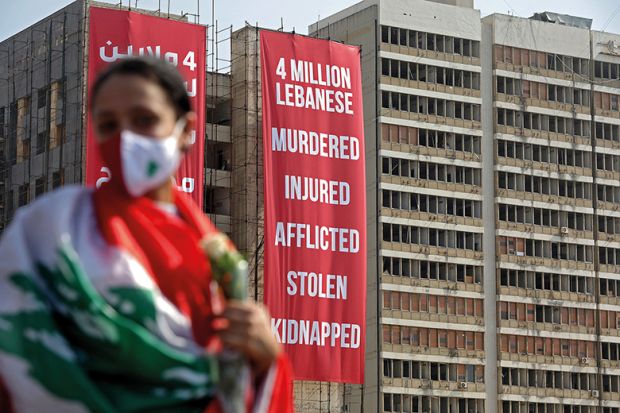Barcelona’s tourist season is finally slowing down, yet I am still here. It feels surreal that I am not going back to Lebanon to continue the struggle for human decency in a country riven by corruption, systemic violence and economic collapse in the wake of the century’s largest non-nuclear explosion.
I cannot go back to Beirut if I want to remain sane, safe and productive. But my engagement will continue. While I am a political scientist by training, I am an activist first. It is how I relate to the world. Ever since I was at school, I have organised protests against injustice, even if it was just because my science teacher gave an unannounced quiz. And, in Spain, I am a Maria Zambrano fellow: a visiting scholar on a scheme named after a philosopher exiled under the Franco dictatorship who published widely on exile, civic engagement and political participation.
I know that the activist label is often frowned upon in academe, so I should be clear what I mean by it. I, too, disapprove of scholars who exploit academia to promote their own ideological agendas or who use their privileged position to critique the actions of activists on the ground. And I reject the idea that scholars have important knowledge to bestow on underprivileged communities or can genuinely give voice to the voiceless in a way that benefits them. To me, activism is a source of empirical inspiration, pushing me to think about the value and purpose of knowledge production.
I grew up during Lebanon’s civil war and was a teenager under the Syrian occupation. During my first undergraduate semester, in 2005, we spent weeks on the streets protesting the assassination of prime minister Rafic Hariri. This connected me with an emerging civil society, of which my university, the American University of Beirut (AUB), was a core pillar. I did all my undergraduate and graduate work between activist meetings, sit-ins and marches against a series of subsequent assassinations of journalists and public intellectuals.
At the beginning of my doctoral work on civil society, the Arab uprisings shook every assumption of so-called Middle East experts. I followed a Libyan group of activists who set up an association to conduct dialogue on Libya’s post-Gaddafi constitution. I ended up with a constitutional ethnography with more than 1,200 participants.
Then the Syrian conflict broke out and Lebanon became host to the highest number of refugees per capita in the world. As an assistant professor, I was advised to concentrate on publishing, but I could not ignore an emerging humanitarian crisis on my doorstep. I started organising and wrote op-eds on the need for refugee protection. I was accepted in activist circles, and community and protest organisers openly shared their experiences with me. They liked the fact that I was a researcher but that I was also “one of them”.
But my activism was not all externally focused. On campus, I helped introduce courses on gender and forced displacement. I co-founded the Women’s Faculty Alliance and the AUB’s first gender centre, working on inclusive employer policies across the MENA region. I was founding director of a scholarship scheme for Afghan women, plus a fellowship programme on women’s engagement in peace and security in conflict zones, such as Iraq, Syria and Yemen.
In autumn 2019, just weeks after submitting a promotion application, the Lebanese revolution started. A group of us declared that the streets were now the classroom and that class would take place there, with students leading the way. But it was only after my application was accepted that I finally felt I had the legitimacy to fully assert my identity as an activist within academe.
Then came the Beirut port explosion in August 2020, which instantly killed 210 people, wounded 6,000 and destroyed 300,000 households. In response to this shattering symbol of failed governance, my colleagues and I launched Khaddit Beirut (Shake Up Beirut), a network of interdisciplinary academics who work with schools, hospitals, local businesses and neighbourhood groups to try to ease the mass suffering.
More than two years later, nobody has been held accountable for the explosion, while most of us have been pushed out of the country. But we are still writing about our experience as a means of documenting how engaged academics can make a difference – and to find some solace through the worst of times.
As a recent migrant, my research agenda cannot but be driven by this moment of forced displacement in the Middle East and Europe. I do want to publish, but the only “gaps in the literature” I am interested in filling relate to experiences of real-life suffering. Every piece of writing I have ever produced has been negotiated with people, community organisers, protesters and local actors. The real purpose was to take action; the writing is really just a way to reflect on that action. After all, the world’s problems are too big for one sector to figure out: scholars must team up with doers in fair, equal partnerships.
All research is embedded in a context and mine is a context of activism; it does not make my academic credentials any less valuable than those of others. It is time to stop frowning at activism in academia and, instead, focus on the way methods, ethics and action can inspire research embedded in the lives of people it affects.
Carmen Geha is a Maria Zambrano scholar and senior researcher in the Interdisciplinary Research Group on Immigration at Pompeu Fabra University, Barcelona.
Register to continue
Why register?
- Registration is free and only takes a moment
- Once registered, you can read 3 articles a month
- Sign up for our newsletter
Subscribe
Or subscribe for unlimited access to:
- Unlimited access to news, views, insights & reviews
- Digital editions
- Digital access to THE’s university and college rankings analysis
Already registered or a current subscriber? Login








